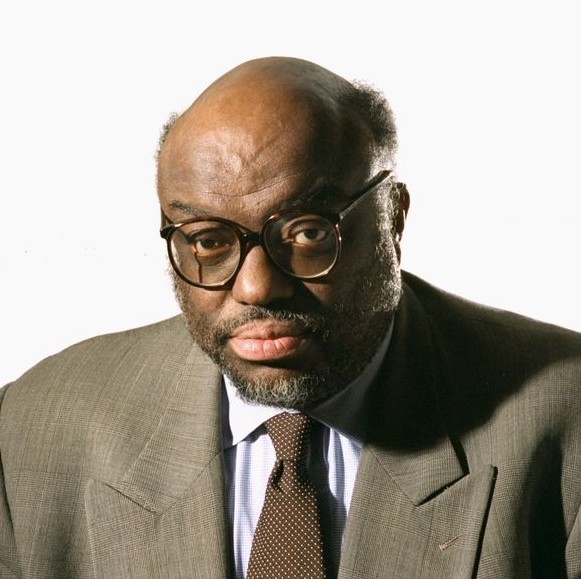Stanley Crouch. Photo: Pat Carroll. Poet, critic, and biographer Stanley Crouch has died at the age of seventy-four. Crouch, who received a MacArthur “Genius” award as well as many other honors, was best known for his writing on jazz and as a cofounder of Jazz at Lincoln Center. His books include Considering Genius and Kansas City Lightning. As a critic for the Village Voice, the New York Times, the Daily News, and JazzTimes, Crouch was famed for his fiery combativeness. As Jelani Cobb put it on Twitter: “ I spent a good part of my 20s arguing with #StanleyCrouch
Rumaan Alam. Photo: David A. Land The winners of the Whiting Literary Magazine Prizes have been announced: One Story, Conjunctions, and Foglifter are the print awardees, with Kweli and Nat. Brut winning in the digital categories. The Literary Arts Emergency Fund will grant 3.5 million dollars to 282 organizations this year. The fund—a venture backed by the Academy of American Poets, the Community of Literary Magazine Presses, and the National Book Foundation—was created this year to help support nonprofit literary groups affected by the pandemic. White Negroes author Lauren Michele Jackson is joining the New Yorker as a contributing
Porochista Khakpour. Photo: Maria Nova Graywolf Press has announced a literary salon, featuring Natalie Diaz, Roy G. Guzmán, Khaled Mattawa, and Kevin Young, who will virtually host conversations “about place and imagination” from their homes. The Intercept has issued a statement on the New York Times’ recent article about their reporting and whistleblower Reality Winner’s 2017 arrest, which “contains little new information” and condemns the outlet for failing to protect their source, who leaked an NSA report on Russian interference in the 2016 election. The Intercept clarifies five points, including that Winner’s own actions “would likely have sealed her
Florence Howe Florence Howe, who founded the Feminist Press and was a “key architect of the women’s studies movement,” died this weekend in Manhattan, at age ninety-one. “When Ms. Howe began teaching in colleges and universities in the 1950s, women’s studies was not an established academic discipline. In fact, it was rare to find a course catalog or syllabus that mentioned scholarship by women at all,” writes Bonnie Wertheim in the New York Times. “With the Feminist Press, founded in 1970, she sought to diversify the materials used in schools around the United States and beyond.” CNN politics reporter
Hari Kunzru. Photo: Clayton Cubitt At Columbia Journalism Review, Bill Grueskin looks into the editorial decisions made by former New York Times editorial page editor James Bennet on a 2017 story that linked a map circulated by Sarah Palin’s PAC with the actions of gunman Jared Lee Loughner, who shot Representative Gabrielle Giffords and killed six others. Bennet rewrote a draft by Times writer Elizabeth Williamson, claiming that “the link to political incitement was clear.” Palin sued the Times for defamation, and the case is set to go to trial in five months. Belarusian Nobel Prize–winning author Svetlana Alexievich
Emma Cline. Photo: Ricky Saiz The National Book Festival (September 25th–27th) and the Brooklyn Book Festival (September 28th–October 5th) will both be held online this year. The National Book Festival will include readings by Colson Whitehead, Marlon James, Carmen Maria Machado, Maaza Mengiste and dozens of other authors. The Brooklyn Book Fest will feature Hari Kunzru, Emily St. John Mandel, Brandon Taylor, Claudia Rankine, and many more. Aperture magazine’s new issue, “Native America” is out now. Guest edited by Wendy Red Star, the issue covers photography and indigenous lives. At the New Republic, Jacob Bacharach reviews Matthew Yglesias’s new
Ayad Akhtar. Photo: Hachette Book Group/Vincent Tullo The Kirkus Prize has announced this year’s finalists. Among the fiction finalists are Raven Leilani for Luster and James McBride for Deacon King Kong; nonfiction finalists include Deirdre Mask for The Address Book and Isabel Wilkerson for Caste. New Yorker staff writer Evan Osnos is publishing Joe Biden: The Life, the Run, and What Matters Now this fall from Scribner. At the New York Times, Parul Sehgal reviews Dutch dairy farmer and poet Marieke Lucas Rijneveld’s International Booker Prize–winning novel, The Discomfort of Evening. The book contains scenes of animal torture and
Janet Malcolm. Photo: © Nina Subin Oprah Winfrey’s next book club pick is Isabel Wilkerson’s Caste: The Origins of Our Discontents, which Winfrey will discuss with the author in an eight-part miniseries on her new Oprah’s Book Club podcast. The National Book Foundation’s lifetime achievement award will be presented to Carolyn Reidy, the late president and CEO of Simon Schuster. Her husband, Stephen, who will accept the 2020 Literarian Award on her behalf, said that the distinction, which has never before been given posthumously, “would have surprised and honored her.” In the New York Review of Books, Janet Malcolm
Octavia E. Butler. Photo: Nikolas Coukouma/Wikicommons At Columbia Journalism Review, Serena Cho writes about how college newspapers are working to address systemic racism in the wake of the movement for Black Lives, often challenging traditional journalistic norms. Yaa Gyasi talks to the Paris Review’s Langa Chinyoka about representing immigration experiences, toxic notions of Black respectability, and how her new novel, Transcendent Kingdom, came to be. The story was inspired by a neuroscientist friend of the author’s: “Around the time that Homegoing came out, she was publishing a big paper that she was really proud of and I was also
Eula Biss At The Cut, Molly Fischer reviews Eula Biss’s new book, Having and Being Had, and considers the trap of the “Self-Aware” writer: “The problem isn’t the self-awareness itself. . . . The problem is the defensive postures that all the self-awareness seems to produce, among characters and the writers who create them.” The Graywolf Press Nonfiction Prize has been awarded to Lars Horn for Voice of the Fish. Anthropologist, author, and activist David Graeber passed away yesterday at the age of fifty-nine. Graeber’s books include Debt: The First 5000 Years, The Democracy Project: A History, a Crisis,
Zadie Smith. Photo: Dominique Nabokov The American Literary Translators Association has announced the longlists for this year’s National Translation Awards in poetry and prose. Nominees include Jordan Stump’s translation of Marie NDiaye’s The Cheffe and Frank Wynne’s translation of Emiliano Monge’s Among the Lost. The Noname Book Club has selected Disability Visibility and Capitalism and Disability as their books of the month. Several influential writers, including Zadie Smith, George Monbiot, and Margaret Atwood, are demonstrating with Extinction Rebellion as part of its campaign against right-wing think tanks hindering climate action. Said Smith: “The heroes of this historical moment are
Kaveh Akbar. Photo: Hieu Minh Nguyen Kaveh Akbar has been named the poetry editor of The Nation. At Vanity Fair, an essay by Jesmyn Ward on losing her husband to COVID-19, writing, and bearing witness: “My loss was a tender second skin. I shrugged against it as I wrote, haltingly, about this woman who speaks to spirits and fights her way across rivers. My commitment surprised me. Even in a pandemic, even in grief, I found myself commanded to amplify the voices of the dead that sing to me, from their boat to my boat, on the sea of
Da’Vine Joy Randolph in High Fidelity Many books that were delayed last spring and this summer have been rescheduled for release this fall. On top of that, there has been, over the summer, a 12 percent spike in print-book sales. Now, Alexandra Alter reports at the New York Times, publishers are facing a significant challenge: “how to print all those books.” “Knopf and Pantheon are shifting the release of more than a dozen fall titles, including a memoir by the cookbook author Deborah Madison and a biography of Sylvia Plath, due to ‘severe capacity issues with our printing partners.’
Yaa Gyasi. Photo: Penguin Random House © Peter Hurley/Vilcek Foundation The large indie bookstore Powell’s Books in Portland, Oregon will no longer sell titles on Amazon. CEO Emily Powell said the company had long seen the negative impact Amazon has had on bookstores and neighborhoods but that selling on the site “was hard to give up, sort of like smoking.” Poetry magazine will not publish its September issue, as it works to revamp its editorial process and hiring practices. The magazine has had several high-profile resignations this summer after an outcry over the publication of a poem by Michael
Emma Copley Eisenberg. Photo: Sylie Rosokoff At Lit Hub, an excerpt from Sarah M. Broom’s The Yellow House about Hurricane Katrina, which hit fifteen years ago this week. This Saturday, Broom will discuss New Orleans as part of the Library of Congress’s National Book Festival. Marieke Lucas Rijneveld has won the International Booker Prize for their novel The Discomfort of Evening. At twenty-nine years old, Rijneveld is the youngest person to have won the award. They will split the award with translator Michele Hutchison. Ava DuVernay talks with Angela Davis at Vanity Fair about the movement for Black lives.
Jenna Wortham At Jacobin, Alex N. Press writes about the police shooting of Jacob Blake and wonders if the response from the Democrats will be merely rhetorical: “Kind words from Democrats may be more palatable than the Republican Party’s racist fearmongering, but they are nowhere near enough.” Press argues that the party should support the movement to defund the police, pointing out that Republicans will accuse them of doing so regardless of what their actual policies may be. At The Nation, John Nichols compares the Republican National Convention to a ponzi scheme. Eve L. Ewing reports on police unions,
Jamel Brinkley. Photo: Arash Saedinia At the New York Times, Elizabeth A. Harris and Concepción de León speak with food writers and chefs Toni Tipton-Martin, Nicole Taylor, and Kristina Gill about their experiences in book publishing. While there is increased demand for cookbooks by Black chefs, authors continue to face steep challenges before and after such book deals: “At every step, the teams involved tend to be overwhelmingly white. Some Black writers say this can put them in a position of having to explain the basics of the food they’re writing about.” Jamel Brinkley, Ottessa Moshfegh, and more authors
Ann Goldstein At the New York Times, Alexandra Alter gives the backstory on how the Pulitzer-winning presidential historian Jon Meacham, “who is not a Democrat,” came to speak at the Democratic National Convention. “Until now, Mr. Meacham has avoided any whiff of partisanship in his work,” Alter writes. “While he delivered eulogies at the funerals of George Bush and the former first lady Barbara Bush, he has never before spoken at a political rally or convention. He agreed to speak this week because he felt it was important to make an argument informed by history for why the country
The Psychology of Fake News, edited by Rainer Greifeneder, Mariela E. Jaffé, Eryn J. Newman, and Norbert Schwarz At Nieman Lab, Laura Hazard Owen outlines four points about “what makes a message ‘feel’ true” from a new collection of research on fake news: repetition, pronounceability, familiarity, and “regular photos.” You can download and read the collection, The Psychology of Fake News, for free from Routledge. For the New York Times, Kyle Buchanan and Reggie Ugwu scrutinize the Criterion Collection’s “blind spots.” Namely, “though the collection features the directorial debuts of multiple generations of white auteurs—including Gus Van Sant, Noah
Jill Filipovic. Photo: Gary He Members of the National Book Critics Circle have released an open letter with short- and long-term recommendations for the organization to better address systemic racism. The letter calls for the cancelation of the 2020 NBCC awards and ceremony, and asks “to prioritize anti-racist labor, institutional accountability, and organizational restructuring immediately.” In June, more than half the NBCC board resigned after a dispute over a statement drafted in support of Black Lives Matter. At the Washington Post, a look at the art of the Zoom book tour. At Gothamist, Danny Lewis reports on efforts by



















